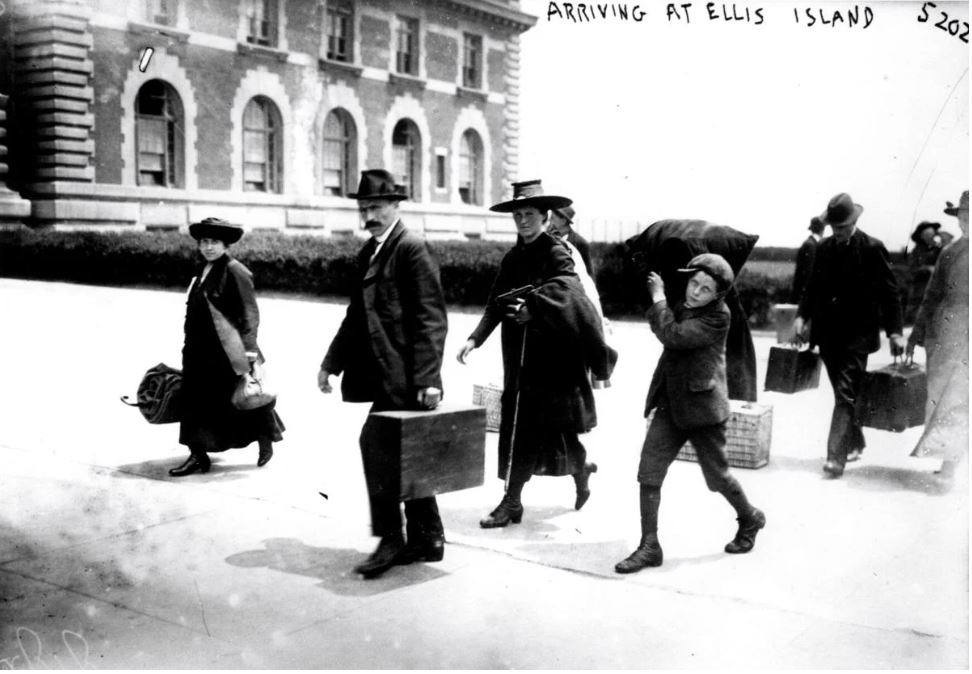
Peter Boyer didn’t set out to make a political statement when he composed “Ellis Island: The Dream of America” in 2001.
But in 2025 America, his piece, which traces the immigration stories of seven people who passed through Ellis Island between 1910 and 1940, can easily be seen through a political lens.
That was never Boyer’s intention, he was quick to note during a phone call last week ahead of the Southern Arizona Symphony Orchestra performing the work this weekend.
SASO is collaborating with the Tucson Jewish Community Center to present the multimedia work in two performances Sunday, May 11, and Monday, May 12, at the J, 3800 E. River Road.
Boyer composed the innovative work using the words and images of actual immigrants as recorded by the Ellis Island Oral History Project. Started in 1973, the project has more than 2,000 interviews with European immigrants who entered through Ellis Island. Most of the interviews were recorded between 1980 and early 1990.
“The thing about this piece that’s pretty unique is the combination of the spoken word of the stories and then the orchestra,” said Boyer, who was commissioned by the Bushnell Center for the Performing Arts in Hartford, Connecticut.
“When an audience sees and hears this piece, they’re hearing real words of real people. … You hear a story and you respond to it intellectually, or you’re listening to what is happening. But the music can go deeper. The music can actually provide an emotional context to it. … I think I managed to find the right balance between those things.”
Boyer acknowledged that in today’s supercharged political climate, as the Trump administration has targeted illegal immigration as its top priority, his piece has taken on a political context that was not as evident when SASO first performed the work in 2008 under then-Conductor Adam Boyle. But he believes the piece has remained popular because it resonates with audiences and orchestras on many levels.
“That has been true throughout the last 22, 23 years,” he said. “I think that, because the piece has an optimistic message about historic American immigration, I think that it does, shall we say, appeal to people who run orchestras in some ways, because it’s an opportunity to make a kind of a statement artistically that maybe aligns with what their goals are.”
SASO Music Director Linus Lerner, a native of Brazil, said the work resonates with him personally.
“As an immigrant myself, I feel deeply compelled to share this story through music,” he said in a written statement. “It serves as a poignant reminder that America’s greatness is built upon the contributions of immigrants, and we are honored to continue that legacy through this performance.”
“Ellis Island: The Dream of America” launched Boyer’s career in a way he hadn’t quite expected. He earned a Grammy nomination for the 2005 recording of the 45-minute work with a cast of renowned stage and screen actors and the Philharmonia Orchestra. A production with the Pacific Symphony conducted by Carl St. Clair was televised by PBS’ prestigious “Great Performances” series in 2018 and rebroadcast in 2020. In 2019, he received an Ellis Island Medal of Honor.
The work also landed Boyer dozens of commissions, most celebrating landmark events including “The Dream Lives On: A Portrait of the Kennedy Brothers,” commissioned by the Boston Pops Orchestra in 2010 to mark the 50th anniversary of John F. Kennedy’s election and the passing of his brother, Massachusetts Sen. Ted Kennedy; “Today We Ask,” his 2023 work for mixed choir, brass quintet and timpani celebrating the coronation of King Charles II; and his latest work, “American Mosaic,” a musical-visual work with narrator commissioned by the John F. Kennedy Center for the Performing Arts to celebrate America’s 250th anniversary next year. The National Symphony Orchestra is set to perform the premiere at the Kennedy Center next February.
“I kind of become, largely because of the success of this piece, somebody whose music is associated with a kind of American sound,” he said, that includes Americans Aaron Copeland, Leonard Bernstein and John Williams. “There’s a kind of American sound, orchestrally, that has very much informed the music that I write.”
This weekend’s performance — the 306th and 307th of the work — is the finale of the JCC’s Beth + Mike Kasser Patron of the Arts Signature Series. Performances will be at 3 p.m. Sunday and 7 p.m. Monday.
In addition to “Ellis Island,” the concert will include Prokofiev’s Overture on Jewish Themes and Bruch’s “Kol Nidrei,” featuring cellist Theodore Buchholz.
